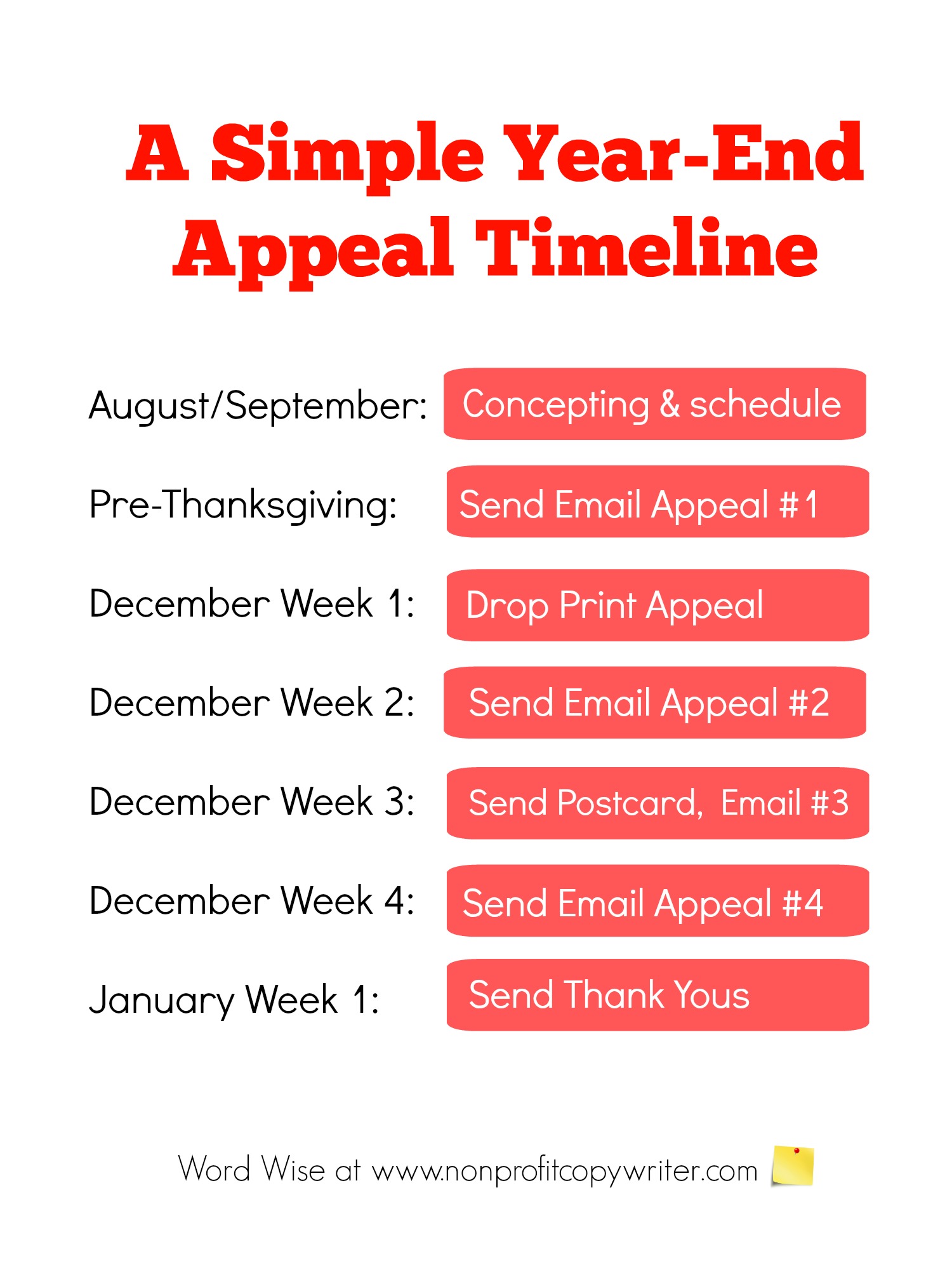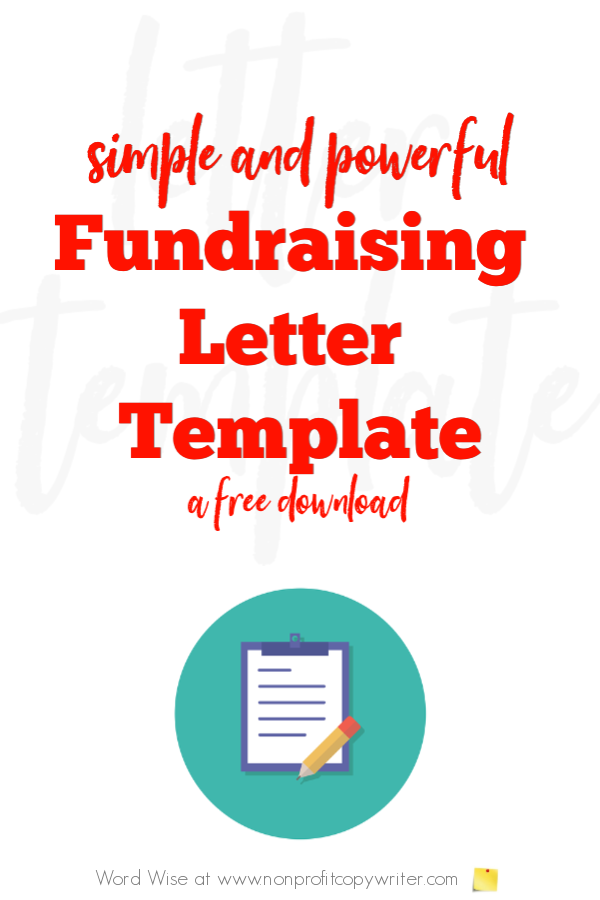A Simple Year-End Appeal Timeline to Help You Get It All Done
Save Time: Get 5 Simple Writing Tips
you can put to use in 10 minutes
Award-winning writer Kathy Widenhouse has helped hundreds of nonprofits and writers produce successful content , with 750K+ views for her writing tutorials. She is the author of 9 books. See more of Kathy’s content here.
Updated 8.28.25
A simple year-end appeal timeline can help you stay on schedule in communicating with partners and prospects and asking them for gifts at year's end.
This is particularly important for nonprofits as the calendar turns over from August to September, and then creeps closer to December. About 40% individual gifts are given to nonprofits during the last quarter of the calendar year. Clearly, this is the time to hit one out of the park.
But even if you completely miss the boat in September and October, there is no need to panic. Here’s an easy plan to use at year-end. It’s simple – content focuses on one topic. It’s inexpensive because it relies largely on electronic media and reuses the same (or similar) content a few times.
What you need
- Your house email list
- Your house mailing list
- Your account with an email list manager (such as Constant Contact)
- Your website (with Donate capability)
Year-End Appeal Timeline: What To Do and When
In August - September
Plan well now, and your campaign will go like clockwork.
- Look at last year. What worked? What didn’t? What can you do better? Answer those questions and you’ll be ready to …
- Select a theme. Choose a project or mission focus around which to build your year-end appeal. Donors like to know where their money is going, why it’s so important to fund a particular project, and what their gift will accomplish. Your year-end series will revolve around this theme. Extra tip: Choose a success story about a beneficiary to spotlight your message.
- Clean up your list. Divide your donor database into different segments, such as major donors, lapsed donors, and first-time donors, so you can send personalized messaging to each group.
- Secure a matching gift. ID a matching gift partner, such as a major donor or a corporation. You can use the match to create a powerful sense of urgency and maximize gifts at year's end.
- Prepare your stuff. Use these days and weeks wisely in the lead up to November and December. Write and design your appeal letters (both print and email), create social media graphics, and prepare your online donation page.
Use this FREE template to write a fundraising letter that pulls gifts.
In November - December
Launch time. Come out strong!
- Send Email #1. Be an early bird. Write and send an
email appeal by mid-November. Focus on your project, featuring the story of
someone who benefited from it. Perhaps you can even have the beneficiary write
a thank you to donors (or, with her permission, write it in her voice.) Tie
together the project and the beneficiary’s gratitude – very appropriate for
Thanksgiving – with a soft Ask that explains, “We want to keep helping people
like Mara,” or “Will you help us do more for children like Stephen?”
This first email is a way to get on your donors’ radar. It’s a good way to thank partners for their past support and introduce your year-end campaign. In email campaigns, always, always include several embedded links as well as a very obvious button link to your website’s Donate page. - Send your year-end print appeal. Beat the crowd and send your print
appeal letter in mid-November. Or, drop it during the last week of
November/early December.
And here’s where things are simpler than you’d imagined. The print appeal’s content can be very similar to your first email – just vary the content slightly for those prospects who read both email and print solicitations.
The main difference between the two is a stronger Ask in this print version. Be very clear and direct: “Now at year’s end, will you give a tax-deductible gift so we can {name the result of the project}?” Include a response device and return envelope as well as your website’s address and instructions for online giving.
And if you’re worried about being repetitive – well, don’t. Research shows that it can take up to 7 “touches” before a prospect responds. Right now you’re only on Touch #2. - Launch your online campaign. Kick off your campaign on social media right before or on Giving Tuesday (the Tuesday after Thanksgiving). Let your email and social media messages complement your print appeal - in fact, use similar language so readers hear your message multiple times.
- Send Email #2. Unpack your project a little bit more deeply than you did in the first email. List the benefits to the project and the many ways lives are affected. Cite some of your organization’s success statistics. Remind prospects that “time is running out” at year's end and boldly ask for their gift. Remember – always include links to your website’s Donate page.
In Mid-December
Now it's time to remind prospects to give.
- Send a reminder postcard. Say, “Don’t forget. Give to {organization} by December 31!” and list some of your project’s benefits described in Email #2. Direct prospects to your website for online donations. Save money by printing the postcard on colored card stock (not white, please) so it sticks out in the mailbox. There’s no need to have the postcard be a full-colored, elaborate deal – it’s just a reminder.
- Send Email #3. Again, it’s a simple reminder. If you’re short on funds and time, use a favorite trick: re-send Email #1 or Email #2, modify it a bit, but use a different and urgent subject line such as, “Give to {organization name} before December 31 for your year-end tax-deduction.” As always in email campaigns … include multiple Donate links.
- Send a special letter or email to lapsed donors. These are folks who have supported you in the past – say within the last 12-24 months – but not recently. And their reasons may have nothing to do with you and your fine work. Your targeted message can remind them of the great things you’re doing and how they can get involved.
In late December
It's crunch time!
- Send Email #4 – a very short email that reminds donors to give before midnight on December 31 if they’ve not yet done so. Profusely thank those who have given already. Wish all a joyous New Year! And … include those Donate links.
In January
Yes, it's a new year. But this is one of the most crucial junctures in your year-end appeal timeline, because donor appreciation builds donor loyalty.
- Send each donor a thank-you letter as gifts come in. If possible, have your Executive Director or Director of Development personalize each with a short note at the bottom – especially for gifts $250 or more. Be sure the thank you references the year-end project campaign. Explain how partners helped you reach your goal – and together, what you will accomplish in the coming year!
- Celebrate making the match. Notify your mailing list immediately when the matching gift challenge has been met. Post on social media! If you meet the match before year-end, then grab the momentum and invite donors to double the match. People love being part of your success.
- Report your results. Send an email and write an article for your next newsletter that report the outcome of the campaign and how donors’ gifts made a difference for the people you serve. Gratitude and transparency build up your partners.
- Jot notes. Review your campaign. What worked? What can you do better? Record your thoughts (and your data) while they’re still fresh in your mind.
And make notes in your calendar for the dates for the next year-end appeal – so you can get it all done sooner and with less stress.
More Year End Writing Tips
Your year-end appeal fundraising checklist ...
Use a year-end online appeal to snag last-minute donor gifts ...
How to identify a matching gift donor for year-end ...
Call to action: have you told your reader what to do?
Get more ideas on our Fundraising Writing Pinterest board...
Return from Year-End Appeal Timeline to Nonprofit Copywriter home
As an Amazon Associate I earn from qualifying purchases.
Share This Page

Named to 2022 Writer's Digest list
BEST GENRE/NICHE WRITING WEBSITE


Stop Wasting Time!
Grab your exclusive FREE guide, "5 Simple Writing Tips You Can Put to Use in 10 Minutes or Less"













